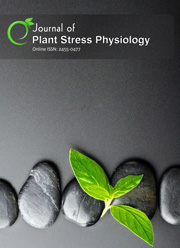Exogenous thiourea modulates antioxidant defence and glyoxalase systems in lentil genotypes under arsenic stress
DOI:
https://doi.org/10.19071/jpsp.2016.v2.3041Abstract
Arsenic (As) is a wide-spread toxic and carcinogenic metalloid, affecting crop productivity worldwide. Lentil, an edible grain legume, is increasingly exposed to soil arsenic contamination. However, our understandings regarding mechanistic details and mitigation strategies against arsenic toxicity in edible legume are extremely poor. Main purpose of the present study was to investigate the As-effects and its mitigation by thiourea (TU), a sulfhydryl bioregulator, in lentil. Four widely grown lentil genotypes were grown in nutrient media, supplemented with 30 μM sodium arsenate (As), As + 6.5 mM TU and As + 13 mM TU, keeping an untreated control for 10 d. As severely affected plant dry weight by accumulating in shoots and roots. However, TU application sequestered As in crop roots and prevented up-ward translocation of As. TU coordinately modulated glyoxalase system I and II (Gly I and II) and ascorbate (AsA)-glutathione (GSH) redox, and antioxidant defense enzymes in both leaves and roots of four genotypes. Elevation of Gly system prevented toxic methyl glyoxal overaccumulation whereas stimulated AsA-GSH cycle enzymes and Glutathione s-transferase and catalase effectively scavenged H2O2 and prevented reactive oxygen species (ROS) -mediated onset of oxidative damage in four genotypes, as was evident from ROS-imaging study. Results suggested exogenous TU stimulated the Gly and antioxidant defense in fine tune against As-induced oxidative damage in lentil genotypes.



 .
.